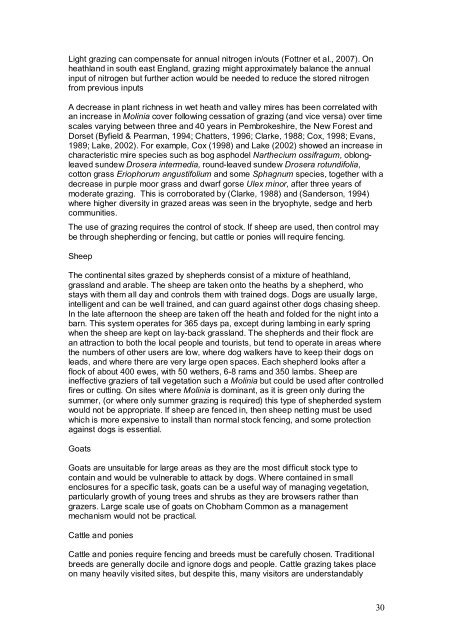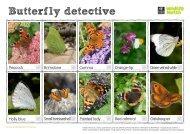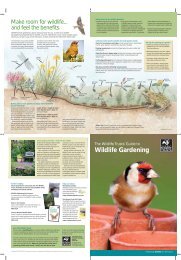CHOBHAM COMMON NNR - Surrey Wildlife Trust
CHOBHAM COMMON NNR - Surrey Wildlife Trust
CHOBHAM COMMON NNR - Surrey Wildlife Trust
Create successful ePaper yourself
Turn your PDF publications into a flip-book with our unique Google optimized e-Paper software.
Light grazing can compensate for annual nitrogen in/outs (Fottner et al., 2007). On<br />
heathland in south east England, grazing might approximately balance the annual<br />
input of nitrogen but further action would be needed to reduce the stored nitrogen<br />
from previous inputs<br />
A decrease in plant richness in wet heath and valley mires has been correlated with<br />
an increase in Molinia cover following cessation of grazing (and vice versa) over time<br />
scales varying between three and 40 years in Pembrokeshire, the New Forest and<br />
Dorset (Byfield & Pearman, 1994; Chatters, 1996; Clarke, 1988; Cox, 1998; Evans,<br />
1989; Lake, 2002). For example, Cox (1998) and Lake (2002) showed an increase in<br />
characteristic mire species such as bog asphodel Narthecium ossifragum, oblongleaved<br />
sundew Drosera intermedia, round-leaved sundew Drosera rotundifolia,<br />
cotton grass Eriophorum angustifolium and some Sphagnum species, together with a<br />
decrease in purple moor grass and dwarf gorse Ulex minor, after three years of<br />
moderate grazing. This is corroborated by (Clarke, 1988) and (Sanderson, 1994)<br />
where higher diversity in grazed areas was seen in the bryophyte, sedge and herb<br />
communities.<br />
The use of grazing requires the control of stock. If sheep are used, then control may<br />
be through shepherding or fencing, but cattle or ponies will require fencing.<br />
Sheep<br />
The continental sites grazed by shepherds consist of a mixture of heathland,<br />
grassland and arable. The sheep are taken onto the heaths by a shepherd, who<br />
stays with them all day and controls them with trained dogs. Dogs are usually large,<br />
intelligent and can be well trained, and can guard against other dogs chasing sheep.<br />
In the late afternoon the sheep are taken off the heath and folded for the night into a<br />
barn. This system operates for 365 days pa, except during lambing in early spring<br />
when the sheep are kept on lay-back grassland. The shepherds and their flock are<br />
an attraction to both the local people and tourists, but tend to operate in areas where<br />
the numbers of other users are low, where dog walkers have to keep their dogs on<br />
leads, and where there are very large open spaces. Each shepherd looks after a<br />
flock of about 400 ewes, with 50 wethers, 6-8 rams and 350 lambs. Sheep are<br />
ineffective graziers of tall vegetation such a Molinia but could be used after controlled<br />
fires or cutting. On sites where Molinia is dominant, as it is green only during the<br />
summer, (or where only summer grazing is required) this type of shepherded system<br />
would not be appropriate. If sheep are fenced in, then sheep netting must be used<br />
which is more expensive to install than normal stock fencing, and some protection<br />
against dogs is essential.<br />
Goats<br />
Goats are unsuitable for large areas as they are the most difficult stock type to<br />
contain and would be vulnerable to attack by dogs. Where contained in small<br />
enclosures for a specific task, goats can be a useful way of managing vegetation,<br />
particularly growth of young trees and shrubs as they are browsers rather than<br />
grazers. Large scale use of goats on Chobham Common as a management<br />
mechanism would not be practical.<br />
Cattle and ponies<br />
Cattle and ponies require fencing and breeds must be carefully chosen. Traditional<br />
breeds are generally docile and ignore dogs and people. Cattle grazing takes place<br />
on many heavily visited sites, but despite this, many visitors are understandably<br />
30



![Thursley Common [Shrike Hill] (SU9041) & Sheets Heath (SU9457 ...](https://img.yumpu.com/11846073/1/184x260/thursley-common-shrike-hill-su9041-sheets-heath-su9457-.jpg?quality=85)

